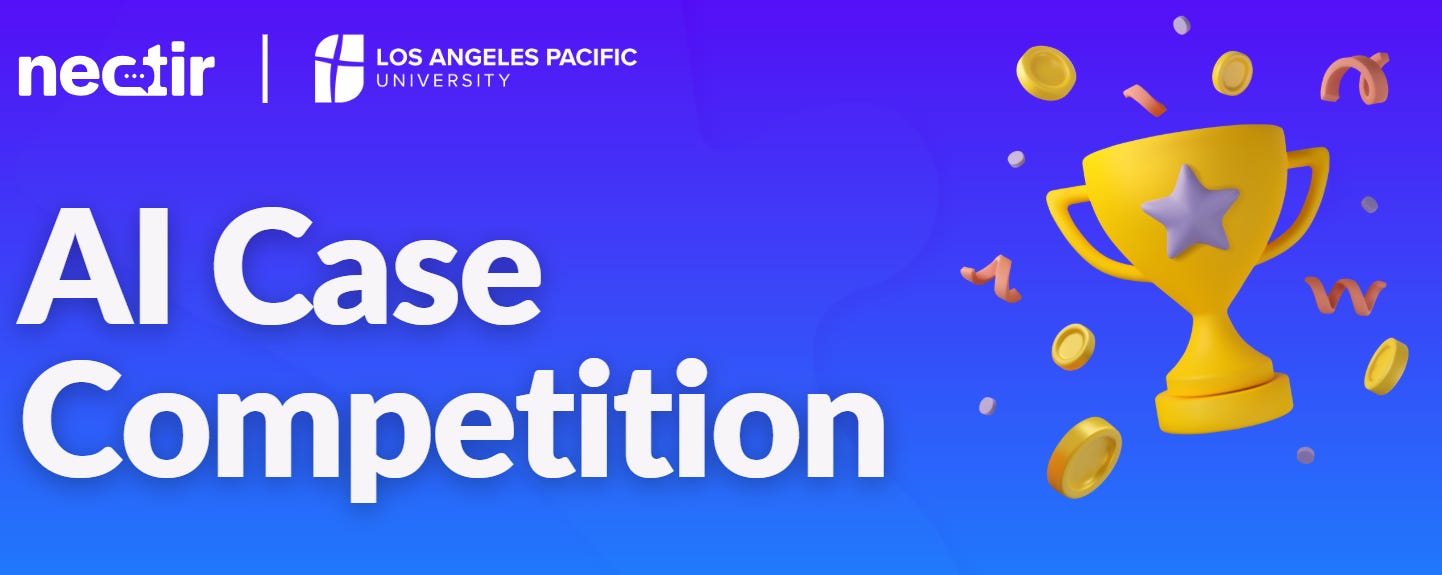AI Transforms Learning at Los Angeles Pacific University: From Pilot Program to Institutional Innovation
How one university has successfully navigated campus-wide AI implementation
Join a thriving community of over 5,100 educators, administrators, researchers, tech skeptics, and enthusiasts passionate about the future of AI in education.
Consider supporting Educating AI by becoming a paid subscriber. Your contribution helps sustain our mission of providing thoughtful analysis and practical insights at the intersection of education and artificial intelligence.
Know that I love to hear from my readers. Have questions, comments, or ideas? Drop me a line at nicolas@pragmaticaisolutions.net
In 2025, Educating AI, my Substack, is increasingly becoming a place where educators, administrators, and tech leaders can come together to share their struggles and triumphs in the ever-evolving landscape of AI implementation in the classroom. We're all grappling with how to best harness this powerful technology, and honest, real-world examples are invaluable. Several weeks ago, I had the distinct pleasure of speaking with Dr. George Hanshaw, the Director of Digital Learning Solutions at Los Angeles Pacific University (LAPU). George is an extremely kind and centered individual, and he spoke with such profound knowledge and quiet confidence about his school's pioneering journey with AI that I was immediately captivated.
As I listened to George describe LAPU's story – the students they serve, the challenges they faced, and the remarkable transformation they've achieved since beginning their AI initiatives in 2023 – I knew I had to share this vision with my readers. It offers a compelling, concrete example of what thoughtful, student-centered AI integration can look like in higher education. It's not about hype or futuristic promises; it's about practical application and measurable results. This article explores LAPU's journey with AI, highlighting key initiatives, quantifiable outcomes, and future directions, drawing heavily from my conversation with Dr. Hanshaw and the university's published research.
From Pilot to Full Integration: The AI Assistant Success Story
LAPU's commitment to AI didn't start with a grand, sweeping declaration. It began, as many successful innovations do, with a carefully designed pilot study in 2023. George shared with me the details of this project, which are also documented in the Open Praxis article, "Exploring the Effectiveness of AI Course Assistants on the Student Learning Experience" (Hanshaw, Vance, & Brewer, 2024). This research wasn't about proving a predetermined point; it was about genuinely testing the potential of AI to help students.
The setup was a classic experiment: a randomized controlled trial. Students in online courses were divided into two groups: one with access to the AI assistant (52 students), and one without (40 students). They measured more than just grades; they looked at the whole student experience: grades (GPA and percentage), intrinsic motivation (enjoyment of learning), self-efficacy (confidence), and feelings of engagement, encouragement, and support.
The results were compelling:
Better Grades: Students with the AI assistant had significantly higher GPAs (average 3.34 vs. 2.77) and final percentage scores (average 88.26% vs. 77.89%). The statistics showed this was a real, meaningful improvement, not just random chance.
Higher Motivation: The AI assistant significantly boosted students' intrinsic motivation – their desire to learn for the sake of learning.
Increased Confidence: Students felt more confident in their abilities with the AI assistant's help.
Engagement, Encouragement, and Support: Interestingly, there was no significant difference here. George explained this is likely because LAPU already has excellent student support through dedicated success coaches. The AI complemented existing human support.
Crucially, these AI assistants weren't about giving students easy answers. They were designed to act like a thoughtful tutor, prompting critical thinking and self-reflection.
This pilot provided strong, data-driven evidence: AI course assistants could significantly improve student outcomes and create a more positive learning experience. It was the foundation for LAPU's broader AI strategy, which we'll explore next.
Beyond the Pilot: Campus-Wide AI Integration
The success of the pilot program was just the beginning. Inspired by the positive results, LAPU has now fully embraced AI, integrating it across the curriculum. A forthcoming article (which George mentioned is currently under revision) will provide all the details, but the key takeaway is this: AI is no longer a niche experiment at LAPU; it's becoming part of the university's DNA.
This widespread adoption is changing the culture on campus. Students are experiencing more personalized learning, with 24/7 access to AI-powered support. Faculty are discovering new ways to use AI to enhance their teaching and provide more targeted feedback. It's a dynamic, evolving process, and it's clear that LAPU is committed to staying at the forefront.
The Center for Artificial Intelligence and Innovation in Learning (CAIIL)
To solidify this commitment, LAPU established the Center for Artificial Intelligence and Innovation in Learning (CAIIL). This center isn't just about LAPU's internal efforts; it's about fostering a broader community of practice. CAIIL is actively:
Partnering with Other Universities: Sharing best practices and collaborating on AI integration strategies.
Connecting with Industry: Building relationships with companies to ensure LAPU graduates are prepared for an AI-driven workforce.
Sharing Resources and Research: Making the findings and created resources accessible.
Get Involved: The AI in Action Conference and Competition
LAPU isn't keeping its AI insights to itself. They're hosting two exciting events to share their experiences and connect with others:
AI in Action Conference (April 30, 2025): This free, virtual conference is all about practical application. Think short, impactful sessions (15-minute live talks, 5-minute recorded highlights) focused on how AI can transform education. If you're interested in presenting, the call for proposals is open until March 24, 2025.
AI Case Competition (April 30, 2025): This competition is a fantastic opportunity for student teams (four students plus a faculty/staff liaison) to showcase their problem-solving skills using Nectir.io's AI assistant. There are cash prizes, and it's a great way to network with industry professionals. Registration is open until March 31, 2025 (with a $50 entry fee).
Conclusion: A Model for AI-Driven Educational Transformation
Los Angeles Pacific University's story, as shared by Dr. Hanshaw, is more than just a success story; it's a blueprint. It demonstrates how a university can move from cautious experimentation with AI to full-scale, thoughtful integration. LAPU's data-driven approach, its commitment to collaboration, and, most importantly, its focus on student success make it a true leader in this rapidly evolving field. They're not just talking about the future of education; they're building it, one student, one course, one partnership at a time. And by sharing their journey openly, they're helping other institutions do the same. This isn't about replacing human educators; it's about empowering them and their students with powerful new tools to enhance learning and prepare for the future.
Nick Potkalitsky, Ph.D.
Check out some of our favorite Substacks:
Mike Kentz’s AI EduPathways: Insights from one of our most insightful, creative, and eloquent AI educators in the business!!!
Terry Underwood’s Learning to Read, Reading to Learn: The most penetrating investigation of the intersections between compositional theory, literacy studies, and AI on the internet!!!
Suzi’s When Life Gives You AI: An cutting-edge exploration of the intersection among computer science, neuroscience, and philosophy
Alejandro Piad Morffis’s Mostly Harmless Ideas: Unmatched investigations into coding, machine learning, computational theory, and practical AI applications
Michael Woudenberg’s Polymathic Being: Polymathic wisdom brought to you every Sunday morning with your first cup of coffee
Rob Nelson’s AI Log: Incredibly deep and insightful essay about AI’s impact on higher ed, society, and culture.
Michael Spencer’s AI Supremacy: The most comprehensive and current analysis of AI news and trends, featuring numerous intriguing guest posts
Daniel Bashir’s The Gradient Podcast: The top interviews with leading AI experts, researchers, developers, and linguists.
Daniel Nest’s Why Try AI?: The most amazing updates on AI tools and techniques
Riccardo Vocca’s The Intelligent Friend: An intriguing examination of the diverse ways AI is transforming our lives and the world around us.
Jason Gulya’s The AI Edventure: An important exploration of cutting edge innovations in AI-responsive curriculum and pedagogy.








Glad to learn about good science and very promising results! The paper linked just made it to pretty explosive science review in the article I'm trying to finish. I think you're going to be interested!